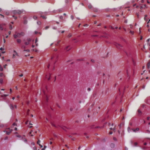A posthoc analysis confirms patients with active psoriatic arthritis (PsA) taking secukinumab experience improvement in all signs and symptoms of PsA as measured by the GRAPPA-OMERACT disease activity core domains.


Mary Beth Nierengarten is a writer, editor and journalist with over 25 years of medical communications experience. She is a regular contributor to a number of online and print publications and writes in most clinical areas, as well as on health policy and economic issues. She lives in Minneapolis and can be reached at [email protected].

A posthoc analysis confirms patients with active psoriatic arthritis (PsA) taking secukinumab experience improvement in all signs and symptoms of PsA as measured by the GRAPPA-OMERACT disease activity core domains.

Clinicians can help their patients tap into personal resilience, and such characteristics as grit, gratitude and grace, to manage their chronic pain, says Afton L. Hassett, PsyD.

Renal arteriosclerosis is common in lupus patients with nephritis and occurs two decades earlier than it does in people without lupus nephritis (LN), report investigators in a study that examined the prevalence of renal arteriosclerosis in LN patients compared with healthy controls.1 The finding suggests that renal arteriosclerosis could be used as a biomarker for…

At the helm of the Collaborative Initiatives Special Committee (COIN), Rosalind Ramsey-Goldman, MD, DrPH, will oversee projects to tackle disparities within rheumatologic care, improve the inclusiveness of ACR initiatives, advance professional development in rheumatology topics and more.

Experts discuss how rheumatologists must consider the psychosocial aspect of care in the decision-making process for women when addressing their reproductive health needs, in addition to medication safety.

Two experts discussed ongoing difficulties in diagnosing autoinflammatory disease, & promising new studies that point to possible genetic roots of autoinflammatory disease.

NIH investigators describe key features and genetic causes of Mendelian interferonopathies, & treatment approaches that may indicate the efficacy of IFN inhibition.

Dr. Kuhn hopes to expand funding for rheumatology research and enhance the ACR’s basic and clinical research pre-conference offerings during her term as chair.

Psoriatic arthritis (PsA) has a higher life impact on women than men, suggesting the need to include life impact as part of the treat-to-target strategy for PsA. This is the finding of a recently published study by Orbai et al., which found female sex independently linked to high PsA life impact.1 The Study The study…

ACR CONVERGENCE 2020—Attention to bone health in people at risk of developing, or who already have, osteoporosis is essential to reduce their increased risk for fragility fractures. Major risk factors for osteoporosis include being female, white, of small frame and having a family history of osteoporosis, as well as having secondary causes of osteoporosis, such…